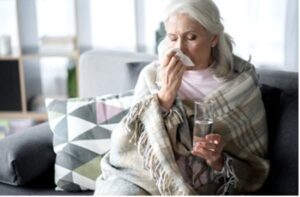Fall and winter can be joyous seasons filled with holidays, good food, and the company of loved ones. However, fun isn’t the only thing that peaks during these colder months. As the seasons change, environmental and social factors make us more susceptible to illnesses such as the common cold, the flu, and RSV infections. But that isn’t the only cause of flu season. So why are winter months peak times for getting sick? Read our latest blog and give viruses the cold shoulder this flu season!
How Temperature Changes Affect Us
The dreary weather affects more than just your mood. Cooler weather creates an ideal setting for viruses to set up camp, as they thrive in cold and dry conditions. Colder weather can also lead to behaviors that promote an increased risk of infection. Naturally, as the weather gets chillier, we tend to seek spaces that are cozy and warm. However, gathering closer together in poorly ventilated indoor spaces may increase one’s risk of coming into contact with germy air and surfaces. Additionally, the use of heating systems may unintentionally dry out indoor air. When all above is combined, it’s not surprising why viruses such as influenza, RSV, and the common cold thrive during this time.

Don’t Just Build a Snowman – Build your Immune System
Don’t drop along with the temperature; instead, provide your body with the adequate tools to help prevent infection. The most effective way to combat the flu and Covid-19 this season is through vaccination. This is the best protection to avoid serious illness and hospitalization According to the Center for Disease Control and Prevention (CDC), in October-November 2021, unvaccinated people had 13.9 times the risks for COVID-19 infection and 53.2 times the risks for COVID-19-associated death, as compared to fully vaccinated and boosted people. Remember, it’s never too late to get your annual flu shot or COVID-19 vaccine.
There are, of course, additional steps one could implement daily to minimize risk, such as these three easy tips:
- Don’t touch your face – Nothing spreads germs with more easily than hand-to-face contact. Rubbing your eyes or scratching your nose is no friend to you, but a great pal to flu season.
- Practice social distancing – Staying at least 6 feet away from others is an easy and effective way to prevent transmission.
- Routine hand washing – Frequent handwashing is an excellent way to shield yourself from various infections such as the flu, common cold, and RSV.
Seattle Clinical Research Center is aware that the most efficient way to remain healthy and safe during these high-risk times is through vaccination. RSV affects 64 million people every year, and though it is one of the last common illnesses without an FDA approved vaccine, there are multiple vaccines that are showing promise and may be approved in the near future. Join us in our efforts to eradicate RSV; adults 18 and over can join an RSV or flu vaccine study today!

Learn more about our currently enrolling RSV vaccine studies and flu vaccine studies because solutions tomorrow begin with change today! To learn more about the studies and eligibility details, please !Contact us at (206) 522 – 3330 ext. 2 with any questions today!
Resources:
https://www.hopkinsmedicine.org/health/conditions-and-diseases/winter-illness-guide
https://www.cdc.gov/rsv/about/transmission.html
https://sitn.hms.harvard.edu/flash/2014/the-reason-for-the-season-why-flu-strikes-in-winter/



